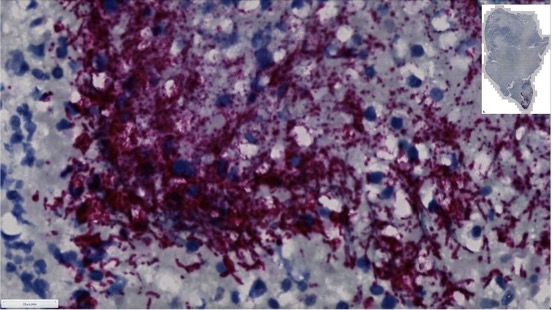Mouth Bacteria Test Could Predict Colon Cancer Progression
April 19, 2024
Source: drugdu
 290
290
 Colon cancer, a relatively common but challenging disease to diagnose, requires confirmation through a colonoscopy or surgery. Recently, there has been a worrying increase in colon cancer rates among younger populations, heightening the need to understand more about the disease's mechanisms and preventive measures. Fusobacterium nucleatum, a bacterium typically linked with dental plaque and gingivitis, is found more frequently in colon cancer tissues than in normal colon tissues, suggesting its involvement in cancer progression and its association with adverse outcomes after treatment. Now, researchers have identified a specific subtype of this bacterium that can migrate to the gut and proliferate within colorectal cancer tumors. The finding could help improve early screening methods for colorectal cancer by paving the way for a test to screen for the presence of this bacterium with a mouth swab or stool sample.
Colon cancer, a relatively common but challenging disease to diagnose, requires confirmation through a colonoscopy or surgery. Recently, there has been a worrying increase in colon cancer rates among younger populations, heightening the need to understand more about the disease's mechanisms and preventive measures. Fusobacterium nucleatum, a bacterium typically linked with dental plaque and gingivitis, is found more frequently in colon cancer tissues than in normal colon tissues, suggesting its involvement in cancer progression and its association with adverse outcomes after treatment. Now, researchers have identified a specific subtype of this bacterium that can migrate to the gut and proliferate within colorectal cancer tumors. The finding could help improve early screening methods for colorectal cancer by paving the way for a test to screen for the presence of this bacterium with a mouth swab or stool sample.
In the study, a team of researchers at Fred Hutch Cancer Center (Seattle, WA, USA) set out to track the journey of this microbe from the oral cavity to the colon and its role in cancer growth. Their investigation led to an unexpected finding that could influence future therapies. They discovered that what was thought to be a single subspecies of Fusobacterium nucleatum in colorectal cancer actually consists of two distinct genetic lineages or "clades." By analyzing the genetic variations between these clades, they identified that the Fna C2 type, one of the clades, possesses unique genetic traits that allow it to travel from the mouth, survive stomach acid, and thrive in the lower gastrointestinal tract. A total of 195 genetic differences were identified between the clades.
Further comparison of tumor and healthy tissues from colorectal cancer patients revealed that only the Fna C2 subtype is significantly prevalent in colorectal tumor tissues and actively contributes to cancer growth. Molecular analysis of over 200 colorectal tumors from two patient cohorts indicated that around 50% contained the Fna C2 lineage. Additionally, examination of numerous stool samples from individuals with and without colorectal cancer showed consistently higher levels of Fna C2 in those with the disease. This research opens promising pathways for the development of microbial cellular therapies, which could involve using engineered bacterial strains to target and treat tumors directly.
“We’ve consistently seen that patients with colorectal tumors containing Fusobacterium nucleatum have poor survival and poorer prognosis compared with patients without the microbe,” said Susan Bullman, Ph.D., Fred Hutch cancer microbiome researcher. “Now we’re finding that a specific subtype of this microbe is responsible for tumor growth. It suggests therapeutics and screening that target this subgroup within the microbiota would help people who are at a higher risk for more aggressive colorectal cancer.”
Source:
https://www.labmedica.com/microbiology/articles/294800900/mouth-bacteria-test-could-predict-colon-cancer-progression.html
Read more on
- Phase III Clinical Trial of Recombinant Staphylococcus Aureus Vaccine Progressing Normality January 21, 2026
- Its drug marketing application for injectable iza-bren has been accepted January 21, 2026
- Kain Technology withdrew a drug registration application, resulting in a profit reduction of 111 million yuan in 2025 January 21, 2026
- Received Notice of Approval for Drug Clinical Trial January 21, 2026
- Breaking news! AstraZeneca to be delisted from Nasdaq. January 21, 2026
your submission has already been received.
OK
Subscribe
Please enter a valid Email address!
Submit
The most relevant industry news & insight will be sent to you every two weeks.



